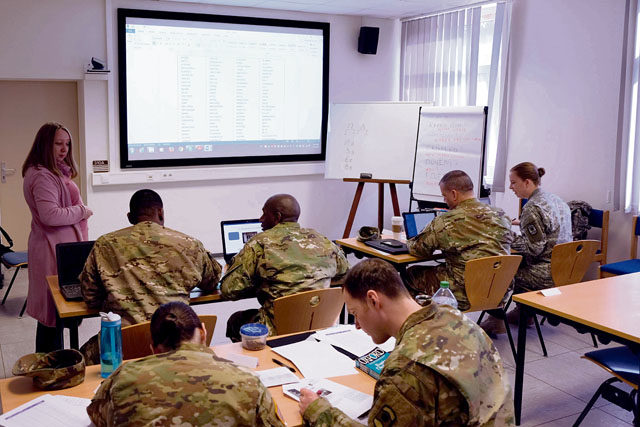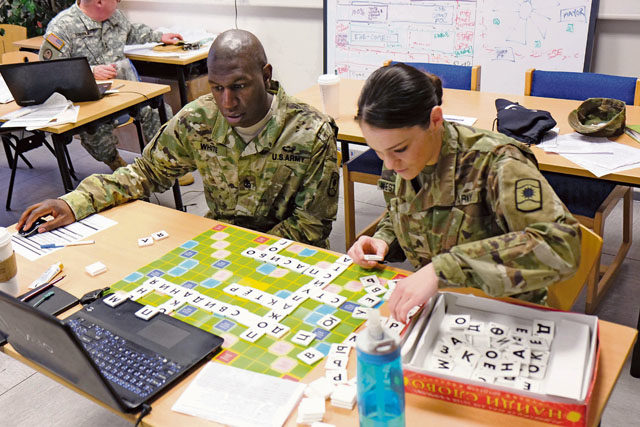
Seven 7th Mission Support Command Soldiers spent a week learning Russian.
The Army Reserve Soldiers were from the 361st Civil Affairs Brigade headquarters in Kaiserslautern and its direct reporting unit, the 457th Civil Affairs Battalion in Grafenwoehr.
The introductory class took place from March 14 to 17 at the 7th MSC headquarters building on Daenner Kaserne.
The Defense Language Institute mobile training team conducted the training, said Maj. Zulma Andrews, the 361st CA BDE operations officer.
“It’s basically a foundation class,” said Irina Mikhailova, the course instructor, from DLI on Ramstein.
The goal was for the students to get comfortable reading words in Russian, which is rated as one of the more difficult languages for English speakers to learn, she said.
DLI ranks Russian as a Class III language, and the hardest languages are Class IV.
Students learned to read the characters in the Russian language, which consists of 33 letters from the Cyrillic script.
Remembering the different letters was a challenge because some of the letters look the same as in English but represent different sounds in Russian, said Sgt. Justine Westbrook, 361st CA BDE.
“The English N sounds like H in Russian,” she said.
The day before the class started, she returned from a personal trip to Hungary.
“It was difficult, because I wanted to reply in Hungarian,” she said.
She plans to attend college in Hungary this fall and was stationed there on active duty before she transitioned to the Army Reserve.
Sgt. Maj. Bobby White also speaks Italian, which he learned from living in Italy for 16 years.
“Russian is harder to learn than Italian,” he said.
He did have some experience with Russian before the class, however, as he worked with colleagues at United States European Command who spoke it.
Staff Sgt. Jared McCauley also speaks German and French.
“Every language is hard to learn,” he said. A student has to put in time and effort to learn any language, he added.
At the end of the week, the students’ goals were to know the Russian alphabet, some basic greetings, politeness phrases, words for family and food as well as some military phrases, Mikhailova said.
There was a final practical exercise as well, she said.
“We’ll be going to a Russian cafe, and they will interview the owners,” she added, noting they learned enough during the week for basic conversations.
“I think that will help prepare us for the real world,” Westbrook said.
The class is a pilot program to build proficiency by holding one day of language training every month, White said.
Five of the students are in positions that call for knowledge of the Russian language, Andrews said. Others are attending to broaden their knowledge.
“It’s all part of our commander’s directive to ensure Russian training and develop our Command Language Program that is still in its infancy,” she said.
This introductory class from DLI may open doors to future training opportunities, she added.



